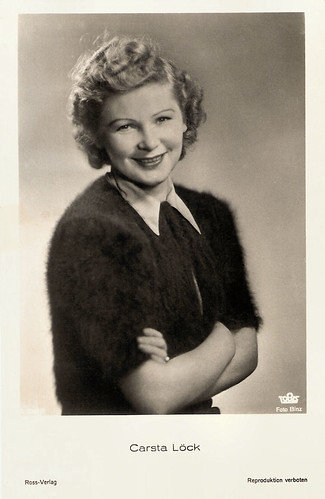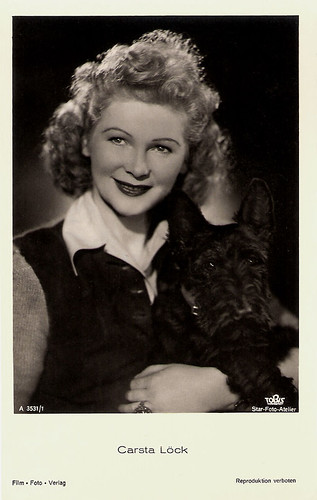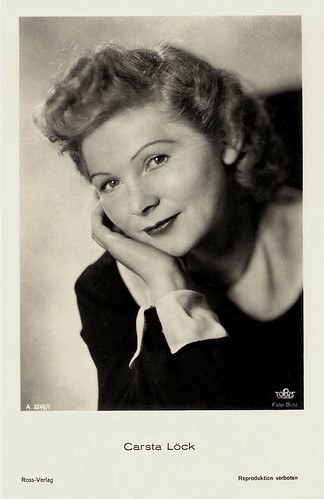German actress Carsta Löck (1902–1993) made over 100 films in Germany, Austria and Sweden, from 1933 to 1983. During the 1930s, she was usually cast in comedies and propaganda films as plain or naive provincial girls, as army brides, maids or jovial tomboys. After the war, Löck segued into character parts as wives, mothers and grandmothers. She is lovingly remembered as storyteller Krösa-Maja in the wonderful Astrid Lindgren film adaptation Emil i Lönneberga/Emil in Lonneberga (1971).

German postcard by Ross Verlag, no. A 3399/1, 1941-1944. Photo: Tobis / Binz.
Carsta Betty Löck was born in 1902 in Deezbüll, Schleswig-Holstein in the German Empire. She was the daughter of a rich merchant and she grew up in Kiel. During her school time, she cherished the wish to become an actress and she took her first acting lessons. Her parents requested that she chose a middle-class job and for years she worked as a magazine illustrator. At the same time she attended drama training and when she was 28, she choose for the theatre and left her parents.
In Berlin, she made her stage debut as Rosi in Hermann Sudermann’s 'Die Schmetterlingsschlacht' (The Butterfly Battle) in 1930. In the same year, she was engaged for the touring company of the Deutsche Volksbühne. She performed at various stages in Berlin, such as the Theater am Nollendorfplatz, the Lessing Theater, the Renaissance Theatre and the Schlossparktheater.
Director Carl Froelich spotted her for the cinema and the 31-year-old actress made her film debut in Reifende Jugend/Ripening Youth (Carl Froelich, 1933). She then played a village maid in Wenn am Sonntagabend die Dorfmusik spielt/When the Village Band Plays on a Sunday Evening (Charles Klein, 1933), and had a small part in Flüchtlinge/Refugees (Gustav Ucicky, 1933), starring Hans Albers and Käthe von Nagy. Flüchtlinge was written by Gerhard Menzel and was based on his own novel depicting ethnic Germans, known as Volga Germans, persecuted by the Bolsheviks on the Sino-Russian border in the Soviet province of Manchuria in 1928. It was the first film to win the German State Prize, and Joseph Goebbels praised it as among those films that, while they did not explicitly cite National Socialist principles, nevertheless embodied its spirit. The refugees are rescued by a heroic German leader much like the Führer; the symbolism is obviously intended to emulate Adolf Hitler.
In the following years, Löck played supporting parts in several comedies, such as Krach um Jolanthe/Trouble with Jolanthe (Carl Froelich, 1934), Onkel Bräsig/Uncle Bräsig (Erich Waschneck, 1936) starring Otto Wernicke, and Autobus S (Heinz Hille, 1937), starring Hermann Speelmans. She often got the part of the simple country girl and with her humour and timing, she became a darling of many German film fans.
She then appeared with Ingrid Bergman and Sabine Peters in the drama Die vier Gesellen/The Four Companions (Carl Froelich, 1938). The film was intended as a star vehicle to launch Bergman's career in Germany. Löck played the female lead in the historical war film Kadetten/Cadets (Karl Ritter, 1939), starring Mathias Wieman. The film is set in 1760, against the backdrop of the Austro-Russian Raid on Berlin during the Seven Years' War. It depicts a group of Prussian cadets holding off superior Russian forces. Because of its anti-Russian theme, the film was pulled from release in 1939 following the Nazi-Soviet Pact. It was put on general release in December 1941, once Germany and the Soviets were at war. The film is loosely connected to the Prussian film cycle of historical epics.

German postcard by Film-Foto-Verlag, no. A 3531/1, 1941-1944. Photo: Tobis / Star-Foto-Atelier.
During the Second World War, Carsta Löck appeared in supporting parts in lightweight dramas like Mädchen im Vorzimmer/The Girl at the Reception (Gerhard Lamprecht, 1940), featuring Magda Schneider, and in propaganda films like Über alles in der Welt/Above All Else in the World (Karl Ritter, 1941), starring Paul Hartmann.
After the war, her career is unbroken and she played a supporting part in the Rubble film Zwischen gestern und morgen/Between Yesterday and Tomorrow (Harald Braun, 1947) starring Hildegard Knef, Winnie Markus and Sybille Schmitz. In Post-war Germany a group of former guests return to a luxurious Munich hotel where they are haunted by memories of their past interaction with Nelly Dreifuss, a Jewish woman who had died during the Nazi era. As with many other German Rubble films, it examines issues of collective guilt and future rebuilding.
She also appeared in the West German comedy Film ohne Titel/Film Without a Title (Rudolf Jugert, 1948) with Hans Söhnker and Hildegard Knef. For the DEFA, she appeared in the drama Die Buntkarierten/Girls in Gingham (Kurt Maetzig, 1949) with Camilla Spira. Her resolute appearance in easily remembered support roles helped her to great popularity in post-war film.
During the 1950s, she continued to appear in supporting parts such as in the comedy Wochenend im Paradies/Weekend in Paradise (Kurt Hoffmann, 1952) starring Paul Dahlke, and the musical comedy Käpt'n Bay-Bay/Captain Bay-Bay (Helmut Käutner, 1953), featuring Hans Albers. Her roles in this period were maids, wives, mothers, housekeepers, secretaries and neighbours. The most notable film of this period was the two-part Thomas Mann adaptation Buddenbrooks (Alfred Weidenmann, 1959).
Her film career drew to a close in the 1960s. Löck returned to the cinema as Krösa-Maja in the Swedish family film Emil i Lönneberga/Emil in Lonneberga (Olle Hellbom, 1971), based on the books by Astrid Lindgren. As Krösa-Maja she told horror stories to the children with goose pimples guarantee. She also appeared in the two sequels, Nya hyss av Emil i Lönneberga/New Mischief by Emil (Olle Hellbom, 1972), and Emil och griseknoen/Emil and the Piglet (Olle Hellbom, 1973). The role made her very popular among children.
Her final film was the German comedy Der Schnüffler/Non-Stop Trouble with Spies (Ottokar Rünze, 1983) with Dieter Hallervorden. After that she retired. In 1989 she received the Filmband im Gold, an award for many years of outstanding achievements in German cinema. Carsta Löck died in Berlin in 1993. She was 90. Since 1963, she was a widow.

German postcard by Ross Verlag, no. A 3246/1, 1941-1944. Photo: Tobis / Binz.
Sources: Stephanie D’heil (Steffi-Line – German), Thomas Staedeli (Cyranos), FilmZeit.de (German - Now defunct), Wikipedia (German and English) and IMDb.
This post was last updated on 26 March 2025.

German postcard by Ross Verlag, no. A 3399/1, 1941-1944. Photo: Tobis / Binz.
The national socialist spirit
Carsta Betty Löck was born in 1902 in Deezbüll, Schleswig-Holstein in the German Empire. She was the daughter of a rich merchant and she grew up in Kiel. During her school time, she cherished the wish to become an actress and she took her first acting lessons. Her parents requested that she chose a middle-class job and for years she worked as a magazine illustrator. At the same time she attended drama training and when she was 28, she choose for the theatre and left her parents.
In Berlin, she made her stage debut as Rosi in Hermann Sudermann’s 'Die Schmetterlingsschlacht' (The Butterfly Battle) in 1930. In the same year, she was engaged for the touring company of the Deutsche Volksbühne. She performed at various stages in Berlin, such as the Theater am Nollendorfplatz, the Lessing Theater, the Renaissance Theatre and the Schlossparktheater.
Director Carl Froelich spotted her for the cinema and the 31-year-old actress made her film debut in Reifende Jugend/Ripening Youth (Carl Froelich, 1933). She then played a village maid in Wenn am Sonntagabend die Dorfmusik spielt/When the Village Band Plays on a Sunday Evening (Charles Klein, 1933), and had a small part in Flüchtlinge/Refugees (Gustav Ucicky, 1933), starring Hans Albers and Käthe von Nagy. Flüchtlinge was written by Gerhard Menzel and was based on his own novel depicting ethnic Germans, known as Volga Germans, persecuted by the Bolsheviks on the Sino-Russian border in the Soviet province of Manchuria in 1928. It was the first film to win the German State Prize, and Joseph Goebbels praised it as among those films that, while they did not explicitly cite National Socialist principles, nevertheless embodied its spirit. The refugees are rescued by a heroic German leader much like the Führer; the symbolism is obviously intended to emulate Adolf Hitler.
In the following years, Löck played supporting parts in several comedies, such as Krach um Jolanthe/Trouble with Jolanthe (Carl Froelich, 1934), Onkel Bräsig/Uncle Bräsig (Erich Waschneck, 1936) starring Otto Wernicke, and Autobus S (Heinz Hille, 1937), starring Hermann Speelmans. She often got the part of the simple country girl and with her humour and timing, she became a darling of many German film fans.
She then appeared with Ingrid Bergman and Sabine Peters in the drama Die vier Gesellen/The Four Companions (Carl Froelich, 1938). The film was intended as a star vehicle to launch Bergman's career in Germany. Löck played the female lead in the historical war film Kadetten/Cadets (Karl Ritter, 1939), starring Mathias Wieman. The film is set in 1760, against the backdrop of the Austro-Russian Raid on Berlin during the Seven Years' War. It depicts a group of Prussian cadets holding off superior Russian forces. Because of its anti-Russian theme, the film was pulled from release in 1939 following the Nazi-Soviet Pact. It was put on general release in December 1941, once Germany and the Soviets were at war. The film is loosely connected to the Prussian film cycle of historical epics.

German postcard by Film-Foto-Verlag, no. A 3531/1, 1941-1944. Photo: Tobis / Star-Foto-Atelier.
Issues of collective guilt and future rebuilding
During the Second World War, Carsta Löck appeared in supporting parts in lightweight dramas like Mädchen im Vorzimmer/The Girl at the Reception (Gerhard Lamprecht, 1940), featuring Magda Schneider, and in propaganda films like Über alles in der Welt/Above All Else in the World (Karl Ritter, 1941), starring Paul Hartmann.
After the war, her career is unbroken and she played a supporting part in the Rubble film Zwischen gestern und morgen/Between Yesterday and Tomorrow (Harald Braun, 1947) starring Hildegard Knef, Winnie Markus and Sybille Schmitz. In Post-war Germany a group of former guests return to a luxurious Munich hotel where they are haunted by memories of their past interaction with Nelly Dreifuss, a Jewish woman who had died during the Nazi era. As with many other German Rubble films, it examines issues of collective guilt and future rebuilding.
She also appeared in the West German comedy Film ohne Titel/Film Without a Title (Rudolf Jugert, 1948) with Hans Söhnker and Hildegard Knef. For the DEFA, she appeared in the drama Die Buntkarierten/Girls in Gingham (Kurt Maetzig, 1949) with Camilla Spira. Her resolute appearance in easily remembered support roles helped her to great popularity in post-war film.
During the 1950s, she continued to appear in supporting parts such as in the comedy Wochenend im Paradies/Weekend in Paradise (Kurt Hoffmann, 1952) starring Paul Dahlke, and the musical comedy Käpt'n Bay-Bay/Captain Bay-Bay (Helmut Käutner, 1953), featuring Hans Albers. Her roles in this period were maids, wives, mothers, housekeepers, secretaries and neighbours. The most notable film of this period was the two-part Thomas Mann adaptation Buddenbrooks (Alfred Weidenmann, 1959).
Her film career drew to a close in the 1960s. Löck returned to the cinema as Krösa-Maja in the Swedish family film Emil i Lönneberga/Emil in Lonneberga (Olle Hellbom, 1971), based on the books by Astrid Lindgren. As Krösa-Maja she told horror stories to the children with goose pimples guarantee. She also appeared in the two sequels, Nya hyss av Emil i Lönneberga/New Mischief by Emil (Olle Hellbom, 1972), and Emil och griseknoen/Emil and the Piglet (Olle Hellbom, 1973). The role made her very popular among children.
Her final film was the German comedy Der Schnüffler/Non-Stop Trouble with Spies (Ottokar Rünze, 1983) with Dieter Hallervorden. After that she retired. In 1989 she received the Filmband im Gold, an award for many years of outstanding achievements in German cinema. Carsta Löck died in Berlin in 1993. She was 90. Since 1963, she was a widow.

German postcard by Ross Verlag, no. A 3246/1, 1941-1944. Photo: Tobis / Binz.
Sources: Stephanie D’heil (Steffi-Line – German), Thomas Staedeli (Cyranos), FilmZeit.de (German - Now defunct), Wikipedia (German and English) and IMDb.
This post was last updated on 26 March 2025.
No comments:
Post a Comment